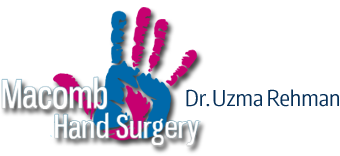How to Avoid Fireworks Injuries to the Fingers & Hands
Fireworks are a traditional part of celebrating American independence on the 4th of July. It’s a tradition that’s as American as Mom and apple pie! But amateur fireworks use can be a dangerous business – resulting in loss of eyesight, loss of fingers and limbs, and even loss of life.
While its best to leave the fireworks displays to the professionals, if you must include them in your Fourth of July celebrations, there are some important precautions you need to take.
Almost every July, southeast Michigan hand specialist Dr. Uzma Rehman sees injuries to fingers and hands due to the use and misuse of fireworks. In this article she explores the sobering statistics about fireworks injuries – and shares tips you can take to help keep yourself and your family safe this 4th of July.
Fireworks Injury Statistics
According to the Michigan Department of Licensing and Regulatory Affairs, Michiganders spend almost two million dollars per year on fireworks.
Amateur detonated fireworks resulted in an estimated 10,200 injuries treated in emergency rooms – including fatalities – across the U.S. in 2022. The estimated rate of fireworks-related ER visits in the United States is an astounding 3.1 per every 100,000 individuals, according to the Consumer Product Safety Commission (CPSD) 2020 Annual Fireworks Report.
According to that report, the body parts most often injured were hands and fingers accounting for 30% of fireworks injuries – with 10% of injuries affecting the arms. Burns were the most common injury to hands, fingers, and arms, representing 58% percent of ER-treated fireworks injuries.
Eye injuries accounted for an estimated 15 percent of fireworks injuries, with head, face, and ears comprising another estimated 15%.
In 2016, Dave Rexroth, the chief meteorologist at Channel 7 WXYZ-TV in Detroit was celebrating the 4th of July with his family. When a box of fireworks didn’t go off, he went to check on it, and it tragically detonated in his face. Tragically, Mr. Rexroth lost his left eye and now must wear a prosthetic eyeball.
Common Injuries to Hands, Fingers & Arms from Fireworks
Burns: Burns are the most common type of injury resulting from fireworks. They can range from first-degree burns, which affect only the outer layer of the skin, to third-degree burns, which penetrate all layers of the skin and can damage underlying tissues. The intense heat and flames from fireworks can cause severe burns, leading to pain, swelling, blistering, and in severe cases, permanent scarring or loss of function.
Lacerations and Cuts: Explosions from fireworks can send shards of materials flying, causing deep cuts and lacerations. These injuries can sever tendons, nerves, and blood vessels, resulting in significant blood loss and requiring surgical intervention to repair. Lacerations can lead to long-term damage if not treated promptly and properly.
Fractures and Dislocations: The force of a firework explosion can cause bones in the hands, fingers, and arms to fracture or dislocate. These injuries often require immobilization with casts or splints, and in severe cases, surgical intervention may be necessary to realign and stabilize the bones. Fractures and dislocations can lead to long-term complications, including chronic pain and reduced mobility.
Amputations: In the most severe cases, fireworks can cause traumatic amputations of fingers, hands, or even parts of the arm. These injuries are devastating and require immediate medical attention. Amputations often lead to permanent disability and require extensive rehabilitation and the use of prosthetics.
Children & Fireworks Injuries
Many 4th of July injuries happen because young children handle fireworks that people think are less powerful and “safe” – such as sparklers. But sparklers actually burn at temperatures of about 2,000 degrees Fahrenheit, which can melt some metals and leave 3rd degree burns.
Also, according to the Consumer Product Safety Commission (CPSD) 2020 Annual Fireworks Report Children younger than 15 years of age accounted for 36 percent of the fireworks-related injuries – with almost half of the ER-treated fireworks injuries to persons younger than 20 years old.
That report also noted that children under 5 years of age experienced an estimated 1,100 injuries (14 percent of all fireworks-related injuries) – while kids 5 to 14 years old experienced an estimated 1,600 fireworks injuries in 2019 alone.
Preventing Fireworks Injury
To help prevent fireworks injuries:
- Only light fireworks one at a time, then move away from them quickly.
- Only set off fireworks in a safe environment away from people, animals, and flammable materials.
- Wear protective gear, such as gloves and safety glasses to help reduce the risk of injury.
- Never throw fireworks.
- Do not shoot fireworks out of a metal or glass container.
- Keep a bucket of water and/or a hose nearby – as well as a fire extinguisher if possible.
- After fireworks are done burning, douse them with plenty of water before handling or discarding.
- Parents should not allow young children to handle, use or be in the vicinity of detonated fireworks.
- Teens should only handle fireworks under the close supervision of adults.
- Never use homemade fireworks.
Taking precautions beforehand, when enjoying fireworks, will help you enjoy this summer holiday while keeping yourself and your loved ones safe!
Southeast Michigan Hand Specialist
If you or a family member has suffered an injury to your fingers, wrist, elbow or arm, it is important to seek immediate medical attention. As with any injury early intervention and treatment is the most effective way to prevent complications or long-term damage to the hands or limbs.
Then, as soon as your injury has been treated and assessed at an ER or urgent care, it is important to schedule an appointment with a specialist, like board certified hand surgeon Dr. Uzma Rehman – and her team of certified hand therapists.
We can provide the specialized treatments and therapies that will minimize any long-term effects of the injury, and restore function and mobility to the hand and limb as effectively and rapidly as possible.

